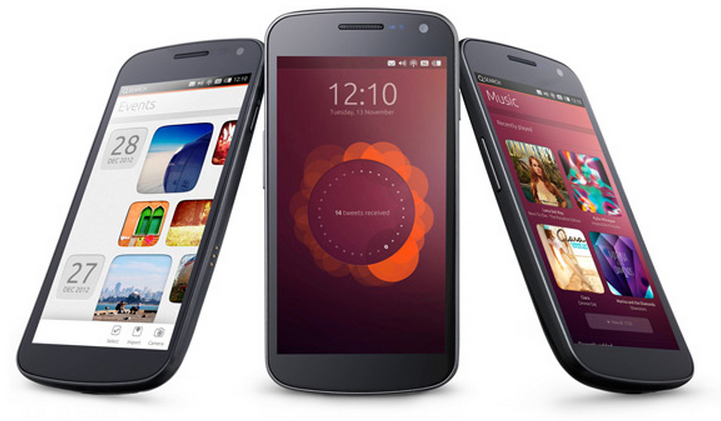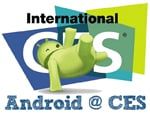Canonical announces its Ubuntu smartphone OS

In its infancy for quite a long time now, software maker Cononical today is taking the wraps off of the smartphone variation of its Linux operating system Ubuntu. The interface will be distinctly in the Ubuntu style, and have many features of other modern smartphone operating systems. There are edge gestures, disappearing controls, global search, voice commands and support for both native and HTML5 web apps.

But Ubuntu for smartphones is more than just a phone OS, as it also provides a full desktop experience when the phone is docked to a mouse, keyboard and monitor. With the current specs of phones, its not unreasonable to expect a single device to be able to handle both a phone and desktop operating system when in each situation. Ubuntu is generally pretty lightweight, so it should run nicely while still remaining feature rich (unlike Motorola Webtop before it.)
Let's not forget that Ubuntu is also open source, giving plenty of options to later customization and tweaking by users as well as quick and free updates in the future. Canonical is holding an informational conference call to provide more details on the launch of its smartphone OS today, which should answer some burning questions. Canonical will also be showing off Ubuntu for smartphones at CES in under a week. In the meantime, take a look at the quick press release after the break.
More: Canonical
Ubuntu comes to the phone, with a beautifully distilled interface and a unique full PC capability when docked
London 2nd January, 2013: Canonical today announced a distinctive smartphone interface for its popular operating system, Ubuntu, using all four edges of the screen for a more immersive experience. Ubuntu uniquely gives handset OEMs and mobile operators the ability to converge phone, PC and thin client into a single enterprise superphone.
“We expect Ubuntu to be popular in the enterprise market, enabling customers to provision a single secure device for all PC, thin client and phone functions. Ubuntu is already the most widely used Linux enterprise desktop, with customers in a wide range of sectors focused on security, cost and manageability” said Jane Silber, CEO of Canonical. “We also see an opportunity in basic smartphones that are used for the phone, SMS, web and email, where Ubuntu outperforms thanks to its native core apps and stylish presentation.”
Ubuntu is aimed at two core mobile segments: the high-end superphone, and the entry-level basic smartphone, helping operators grow the use of data amongst consumers who typically use only the phone and messaging but who might embrace the use of web and email on their phone. Ubuntu also appeals to aspirational prosumers who want a fresh experience with faster, richer performance on a lower bill-of-materials device.
Be an expert in 5 minutes
Get the latest news from Android Central, your trusted companion in the world of Android
The handset interface for Ubuntu introduces distinctive new user experiences to the mobile market, including:
- Edge magic: thumb gestures from all four edges of the screen enable users to find content and switch between apps faster than other phones.
- Deep content immersion - controls appear only when the user wants them.
- A beautiful global search for apps, content and products.
- Voice and text commands in any application for faster access to rich capabilities.
- Both native and web or HTML5 apps.
- Evolving personalised art on the welcome screen.
Ubuntu offers compelling customisation options for partner apps, content and services. Operators and OEMs can easily add their own branded offerings. Canonical’s personal cloud service, Ubuntu One, provides storage and media services, file sharing and a secure transaction service which enables partners to integrate their own service offerings easily.
Canonical makes it easy to build phones with Ubuntu. The company provides engineering services to offload the complexity of maintaining multiple code bases which has proven to be a common issue for smartphone manufacturers, freeing the manufacturer to focus on hardware design and integration. For silicon vendors, Ubuntu is compatible with a typical Android Board Support Package (BSP). This means Ubuntu is ready to run on the most cost-efficient chipset designs.
In bringing Ubuntu to the phone, Canonical is uniquely placed with a single operating system for client, server and cloud, and a unified family of interfaces for the phone, the PC and the TV. “We are defining a new era of convergence in technology, with one unified operating system that underpins cloud computing, data centers, PCs and consumer electronics” says Mark Shuttleworth, founder of Ubuntu and VP Products at Canonical.
Canonical currently serves the leading PC OEMs: ASUS, Dell, HP, and Lenovo all certify the majority of their PCs on Ubuntu and pre-install it in global markets. Over 20 million desktop PCs run the OS today, and Canonical estimates that close to 10% of the world’s new desktops and laptops will ship with Ubuntu in 2014. Ubuntu is also wildly popular as a server platform, the number one server OS on the key major public clouds and the leading host OS for OpenStack, the open source IAAS.
Andrew was an Executive Editor, U.S. at Android Central between 2012 and 2020.
